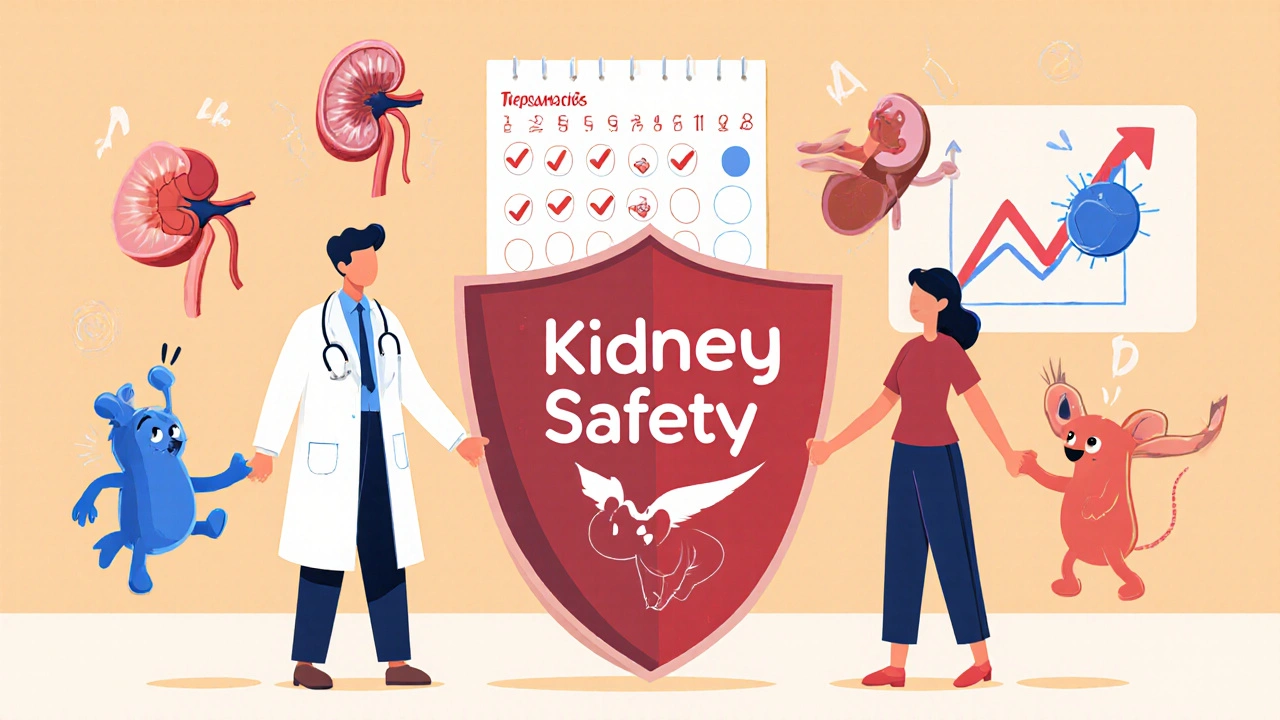If you’re living with HIV and keep getting cold sores or shingles, you’ve probably heard of famciclovir. It’s a pill doctors often prescribe to fight herpes viruses - but what does it actually do for someone with HIV? And is it safe? This isn’t just about taking a pill when a blister shows up. It’s about understanding how your immune system, your meds, and this antiviral work together - or sometimes, against each other.
What is famciclovir, really?
Famciclovir is an antiviral drug. It doesn’t kill viruses. Instead, it stops them from copying themselves. It’s a prodrug, meaning your body turns it into penciclovir, the active form that blocks herpes viruses from making new DNA. That’s how it helps with outbreaks of herpes simplex (cold sores, genital herpes) and varicella-zoster (shingles).
It’s not a cure. You still carry the virus. But famciclovir can cut outbreak length by a few days, reduce pain, and lower how often they come back. For someone with a healthy immune system, that’s helpful. For someone with HIV, it can be life-changing.
Why does HIV change everything?
HIV weakens your immune system - especially when CD4 counts drop below 200. That’s when herpes viruses start running wild. Outbreaks become more frequent, last longer, and can get more severe. A cold sore that clears in a week for most people might stick around for months in someone with advanced HIV.
Studies from the CDC show that up to 70% of people with HIV and low CD4 counts get recurrent herpes outbreaks. Without treatment, these can lead to skin infections, nerve damage, or even spread to the eyes or brain. That’s why antivirals like famciclovir aren’t optional - they’re essential.
How does famciclovir interact with HIV meds?
This is where things get tricky. Famciclovir doesn’t directly interact with most HIV drugs. But here’s the catch: your body processes both through the kidneys. If you’re on tenofovir, a common HIV drug, your kidney function matters more than ever.
A 2023 review in Antiviral Therapy found that people on both tenofovir and high-dose famciclovir had a slightly higher risk of kidney stress. It’s rare, but it happens. That’s why doctors check your creatinine levels before starting famciclovir and again after a few weeks.
Also, if you’re on ritonavir-boosted regimens - like darunavir or atazanavir - famciclovir levels might rise slightly. Not enough to be dangerous, but enough that your doctor might lower the dose if you’re older or have kidney issues.
What’s the right dose for someone with HIV?
For a healthy person with a cold sore, 1,500 mg once is often enough. For someone with HIV, that’s not enough. Most guidelines recommend:
- Herpes simplex outbreaks: 500 mg twice daily for 7-10 days
- Shingles: 500 mg every 8 hours (three times a day) for 7 days
- Suppression (to prevent outbreaks): 250 mg twice daily
These doses are higher than for people without HIV because your immune system can’t help clear the virus on its own. You need the drug to do more of the work.
If your CD4 count is under 100, your doctor might even increase the suppression dose to 500 mg twice daily. That’s not off-label - it’s standard practice in HIV clinics across the UK and US.

Can famciclovir prevent HIV complications?
Yes - and that’s the big win. By keeping herpes viruses under control, you reduce inflammation in your body. Chronic herpes outbreaks cause constant immune activation. That’s bad news for someone with HIV because it speeds up disease progression.
A 2022 study in The Lancet HIV followed 1,200 people with HIV and recurrent herpes. Those on daily famciclovir had a 30% lower risk of developing AIDS-defining illnesses over five years. Why? Less viral chaos. Fewer immune system crashes. Better CD4 recovery.
It’s not magic. But it’s one of the few treatments that helps your body breathe easier while you’re on HIV meds.
Side effects: What to watch for
Famciclovir is generally well-tolerated. But with HIV, you’re already juggling multiple meds. Watch for:
- Headaches (common, usually mild)
- Nausea or stomach upset (take with food)
- Dizziness or fatigue (rare, but real)
- Confusion or hallucinations (very rare - only in people with severe kidney failure)
Don’t ignore kidney pain, swelling in your feet, or changes in urine output. These could signal kidney stress. Get a blood test. Don’t wait.
Also, famciclovir doesn’t cause liver damage like some older antivirals. That’s a plus if you’re on hepatitis C co-treatment or have fatty liver from HIV meds.
When not to use famciclovir
There are only a few clear red flags:
- You’re allergic to penciclovir or acyclovir
- Your creatinine clearance is under 25 mL/min (severe kidney disease)
- You’re on high-dose probenecid (rare, but it blocks famciclovir clearance)
If you’re on dialysis, you can still take famciclovir - but only after dialysis, and at a reduced dose. Always tell your pharmacist you’re on HIV treatment. They’ll catch interactions you might miss.

What about other herpes treatments?
You’ve probably heard of acyclovir and valacyclovir. All three work the same way. But here’s the difference:
| Drug | Dosing frequency | Kidney safety | Best for |
|---|---|---|---|
| Famciclovir | Twice daily | Good, if kidneys okay | Convenience, suppression |
| Valacyclovir | Twice daily | Good, but higher doses risk kidney | Shingles, outbreaks |
| Acyclovir | Three to five times daily | Best for poor kidney function | Severe kidney disease, elderly |
Famciclovir wins on convenience. Two pills a day instead of five. That’s huge when you’re already taking 3-4 HIV pills daily. But if your kidneys are weak, acyclovir is safer. Your doctor will pick based on your lab results - not your preference.
What should you do if you’re on HIV treatment?
Here’s your simple checklist:
- Ask your HIV doctor if you need famciclovir - even if you haven’t had an outbreak in months.
- Get a kidney function test (creatinine, eGFR) before starting.
- If you’re on tenofovir, ask if switching to TAF (tenofovir alafenamide) is an option - it’s gentler on kidneys.
- Take famciclovir exactly as prescribed. Don’t skip doses, even if you feel fine.
- Report any new confusion, swelling, or pain in your back or sides.
- Keep a log of outbreaks: when they start, how long they last, what helped.
Many people with HIV don’t realize herpes is a sign their immune system is still struggling. Treating it isn’t just about comfort - it’s part of your long-term HIV care.
Final thought: It’s not just a cold sore pill
Famciclovir isn’t a luxury. For someone with HIV, it’s a tool that helps your body stay stronger. It reduces pain. It lowers inflammation. It gives your immune system a break. And when your immune system is less stressed, your HIV meds work better.
If you’ve been told to take it and you’re unsure - ask why. If you’ve stopped taking it because you feel fine - talk to your doctor. Herpes doesn’t disappear. It waits. And when your CD4 drops, it comes back harder.
Take it seriously. Not because it’s scary - but because it works.
Can famciclovir cure HIV?
No. Famciclovir only targets herpes viruses like HSV and VZV. It has no effect on HIV itself. People sometimes confuse antivirals, but HIV requires specific drugs like tenofovir, dolutegravir, or raltegravir. Taking famciclovir won’t lower your viral load or improve your CD4 count directly - but by controlling herpes outbreaks, it reduces stress on your immune system, which helps HIV treatment work better.
Is famciclovir safe during pregnancy if I have HIV?
Famciclovir is classified as Pregnancy Category B, meaning animal studies show no risk and there’s no clear evidence of harm in humans. If you’re pregnant and have HIV, your doctor may still prescribe it to prevent herpes outbreaks that could be passed to the baby during delivery. But they’ll monitor you closely. Always tell your OB-GYN and HIV specialist you’re taking it - they’ll coordinate care.
How long should I take famciclovir for suppression?
There’s no fixed timeline. If you have more than six outbreaks a year, or if outbreaks are severe, daily suppression is usually recommended long-term. Some people take it for years. Others stop if their CD4 count stays above 500 for over a year and outbreaks stop. Never stop without talking to your doctor - stopping suddenly can cause a rebound.
Can I drink alcohol while taking famciclovir and HIV meds?
Moderate alcohol is usually okay. But heavy drinking stresses your liver and kidneys - and you’re already on meds that do the same. If you drink regularly, your doctor may adjust your famciclovir dose or suggest a kidney check. One or two drinks a week is fine for most. More than that? Talk to your provider.
What if famciclovir stops working?
Resistance is rare but possible, especially in people with very low CD4 counts who’ve taken antivirals for years. If outbreaks keep coming despite treatment, your doctor may test the virus for resistance. Alternatives include higher-dose valacyclovir, intravenous acyclovir, or topical cidofovir. Newer drugs like brincidofovir are being studied for resistant cases. Don’t try to increase your dose yourself - it won’t help and could hurt your kidneys.
If you’re managing HIV and herpes together, you’re not alone. Thousands of people do this every day. The key is staying in touch with your care team, tracking your symptoms, and taking your meds as directed. Famciclovir isn’t flashy - but it’s one of the quiet heroes in HIV care.

Comments
AARON HERNANDEZ ZAVALA
I’ve been on famciclovir for years with HIV and honestly it’s been a game changer. No more monthly cold sores wrecking my face. I take 250mg twice a day and barely think about it. My doctor said it’s like giving my immune system a break so it can focus on fighting HIV instead of herpes. Simple stuff but it works.
On November 16, 2025 AT 11:21
Lyn James
Let me tell you something nobody else will: this whole ‘famciclovir helps HIV’ thing is a distraction. People think taking antivirals for herpes is some kind of spiritual upgrade when really it’s just managing symptoms. You’re still infected. You’re still immunocompromised. The real cure is living right-no alcohol, no stress, no excuses. If your body’s falling apart, maybe you’re not doing the hard work. This pill doesn’t fix laziness. It just masks it with a prescription.
On November 18, 2025 AT 00:54
Craig Ballantyne
From a clinical pharmacology standpoint, the renal clearance dynamics between famciclovir and tenofovir are well-documented in the 2023 Antiviral Therapy meta-analysis. The key variable is eGFR stratification-not dosing frequency. In patients with baseline creatinine clearance >60 mL/min, no dose adjustment is required. However, concurrent use with ritonavir-boosted PIs warrants a 20% reduction in famciclovir due to OATP1B1 inhibition. The real clinical takeaway? Always check eGFR pre-initiation and at 2 weeks. This isn’t anecdotal-it’s guideline-driven.
On November 18, 2025 AT 06:07
Nicholas Swiontek
THIS. 🙌 I was scared to start it because I thought it’d mess with my HIV meds. But my doctor explained it like I was 5 and now I take it like clockwork. My outbreaks went from 4x/month to maybe once a year. Also, side effects? Barely noticed. Just take it with food and drink water. You got this 💪 #HIVWarrior
On November 18, 2025 AT 06:16
Robert Asel
It is imperative to note that the assertion that famciclovir reduces the incidence of AIDS-defining illnesses by 30% is statistically significant but not causally definitive. The Lancet HIV study referenced employed a retrospective cohort design with potential confounding variables including adherence to ART, baseline CD4, and concomitant use of other prophylactic agents. One must exercise caution in interpreting observational data as therapeutic validation. Furthermore, the term 'quiet hero' is emotionally charged and lacks scientific precision. Medical interventions should be evaluated on pharmacokinetic and clinical endpoints-not metaphor.
On November 19, 2025 AT 08:56
Shannon Wright
For anyone reading this and feeling overwhelmed-take a breath. You’re not alone. I’ve been in your shoes. I had a CD4 count of 87 and was getting shingles every 3 months. I thought I was broken. But starting famciclovir didn’t just stop the blisters-it gave me back my life. I started sleeping again. I stopped dreading every little sore. It’s not magic, but it’s medicine that works. And if you’re worried about your kidneys? Talk to your provider. Ask for TAF instead of TDF. Get your labs done. Take your pills. You’re doing better than you think. And if you need someone to talk to? I’m here. We’ve got this.
On November 20, 2025 AT 20:26
vanessa parapar
Wait, so you’re telling me I’ve been taking this for years and nobody told me it helps with HIV progression? I feel like I’ve been living in a cave. Also, why is everyone so chill about alcohol? One drink is fine? My doctor said even one glass of wine can spike my liver enzymes. You’re all just winging it, aren’t you?
On November 22, 2025 AT 05:39